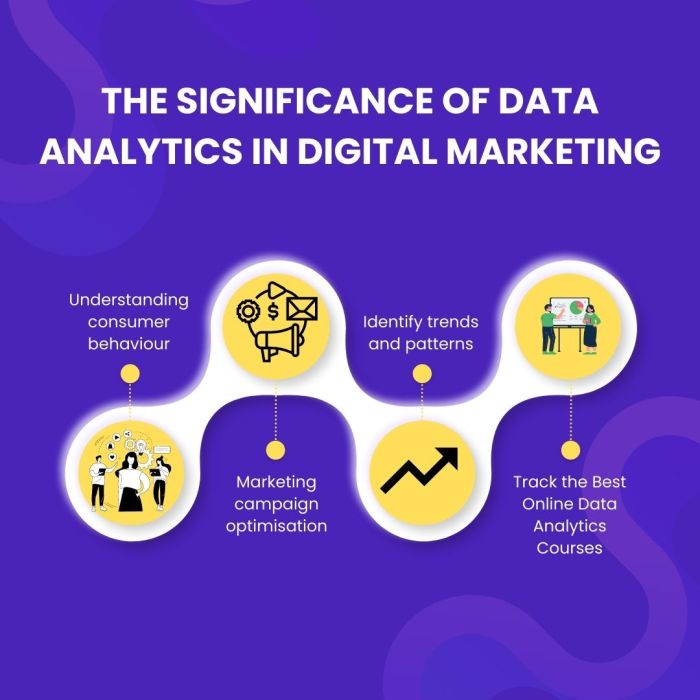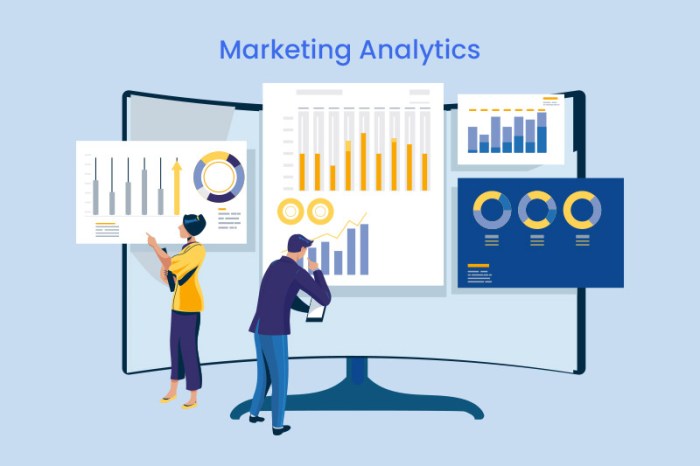Using Data Analytics for Marketing, dive into the world of consumer insights and strategic decision-making through data-driven approaches that redefine marketing strategies for businesses today. From understanding customer behavior to optimizing campaign performance, this topic explores the power of analytics in transforming the marketing landscape.
Importance of Data Analytics in Marketing
Data analytics plays a crucial role in helping businesses make informed marketing decisions by analyzing and interpreting large volumes of data. By utilizing data analytics tools, companies can optimize their marketing campaigns, understand customer behavior, and tailor their strategies to meet the needs and preferences of their target audience.
Optimizing Marketing Campaigns
- By analyzing data from various sources such as website traffic, social media engagement, and email campaigns, businesses can identify trends and patterns to optimize their marketing efforts.
- Tools like Google Analytics and CRM software can provide valuable insights into the effectiveness of different marketing channels and campaigns, helping companies allocate resources more efficiently.
- Through A/B testing and data-driven decision-making, organizations can refine their messaging, targeting, and overall strategy to reach their ideal customers effectively.
Understanding Customer Behavior and Preferences
- Data analytics allows businesses to create detailed customer profiles based on demographics, purchasing patterns, and engagement metrics, enabling personalized marketing campaigns.
- By tracking customer interactions across multiple touchpoints, companies can gain a deeper understanding of customer journeys and optimize the user experience.
- Tools like customer relationship management (CRM) systems and predictive analytics can help businesses anticipate customer needs and preferences, leading to more targeted and effective marketing strategies.
Types of Data Used in Marketing Analytics: Using Data Analytics For Marketing
When it comes to marketing analytics, businesses rely on various types of data to make informed decisions and drive successful campaigns. Let’s dive into the different sources of data used in marketing analytics and how businesses can effectively collect and utilize this data for their marketing strategies.
Customer Data
Customer data is a goldmine for marketers, providing insights into consumer behavior, preferences, and purchasing patterns. This data includes demographic information, past purchases, website interactions, and more. By analyzing customer data, businesses can personalize their marketing efforts, target the right audience, and improve customer engagement.
Campaign Performance Data
Tracking and analyzing campaign performance data is crucial for evaluating the effectiveness of marketing initiatives. This data includes metrics like click-through rates, conversion rates, ROI, and engagement levels. By monitoring these key performance indicators, businesses can optimize their campaigns in real-time, allocate resources efficiently, and maximize their marketing ROI.
Social Media Data
In today’s digital age, social media data plays a vital role in marketing analytics. Businesses can gather valuable insights from social media platforms like Facebook, Instagram, Twitter, and LinkedIn. This data includes follower demographics, engagement metrics, post performance, and sentiment analysis. By leveraging social media data, businesses can enhance their social media strategies, improve brand awareness, and connect with their target audience effectively.
Importance of Data Quality and Accuracy, Using Data Analytics for Marketing
Data quality and accuracy are paramount in marketing analytics. Inaccurate or incomplete data can lead to flawed insights and misguided decisions. Businesses must ensure data integrity, consistency, and reliability to make data-driven decisions confidently. By maintaining high standards of data quality, businesses can improve campaign performance, enhance customer relationships, and drive sustainable growth.
Implementing Data Analytics Tools in Marketing

Implementing data analytics tools in marketing is crucial for businesses to make informed decisions and optimize their marketing strategies. By leveraging these tools, companies can track and analyze customer behavior, campaign performance, and overall marketing ROI.
Best Practices for Implementing Data Analytics Tools
- Define clear objectives: Identify what you want to achieve with data analytics and set specific goals.
- Choose the right tools: Select data analytics tools that align with your business needs and budget.
- Train your team: Ensure that your marketing team is properly trained to use the tools effectively.
- Integrate data sources: Combine data from various sources to get a comprehensive view of your marketing efforts.
- Regularly review and optimize: Continuously monitor your data analytics processes and make adjustments as needed.
Popular Data Analytics Tools in Marketing
- Google Analytics: A free tool that provides detailed insights into website traffic and user behavior.
- Adobe Analytics: Offers advanced analytics capabilities for tracking and analyzing digital marketing campaigns.
- HubSpot: Combines marketing automation with analytics to help businesses attract, engage, and delight customers.
Benefits of Using Data Analytics Tools
- Improved decision-making: Data analytics tools provide valuable insights that help businesses make informed decisions.
- Enhanced targeting: By analyzing customer data, companies can target the right audience with personalized marketing campaigns.
- Measuring ROI: Data analytics tools enable businesses to track and measure the performance of their marketing initiatives, allowing for optimization and improved ROI.
Personalization and Targeting with Data Analytics

Data analytics plays a crucial role in personalizing marketing messages for different target audiences. By analyzing customer data, businesses can tailor their marketing strategies to meet the specific needs and preferences of individual customers, leading to more effective and engaging campaigns.
Examples of Successful Marketing Campaigns
- Amazon: Amazon uses data analytics to personalize product recommendations for each customer based on their past purchases and browsing behavior. This targeted approach has significantly increased customer engagement and sales.
- Sephora: Sephora utilizes data analytics to provide personalized beauty recommendations to customers through their online platform. By analyzing customer preferences and purchase history, Sephora offers tailored product suggestions, resulting in higher customer satisfaction and loyalty.
Ethical Considerations of Data Analytics in Targeted Marketing
- Privacy Concerns: Collecting and analyzing personal data for marketing purposes raises privacy concerns among consumers. Companies must ensure transparency and obtain consent before using customer data for targeted marketing.
- Data Security: Safeguarding customer data is crucial to prevent unauthorized access or data breaches. Companies must implement robust security measures to protect sensitive information from potential threats.
- Transparency: Businesses should be clear about how they collect, use, and store customer data for marketing purposes. Transparency builds trust with customers and helps maintain a positive brand reputation.
